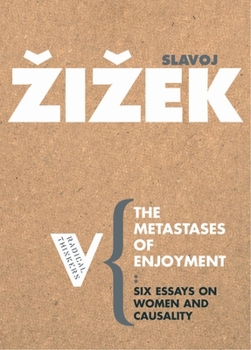The Metastases of Enjoyment: On Women and Casuality
Select Format
Select Condition 
Book Overview
The experience of the Yugoslav war and the rise of "irrational" violence in contemporary societies provides the theoretical and political context of this book, which uses Lacanian psychoanalysis as... This description may be from another edition of this product.
Format:Paperback
Language:English
ISBN:1844670619
ISBN13:9781844670611
Release Date:January 2006
Publisher:Verso
Length:240 Pages
Weight:0.55 lbs.
Dimensions:0.8" x 5.1" x 7.8"
Customer Reviews
2 ratings
Impressive: intellectual fireworks
Published by Thriftbooks.com User , 16 years ago
Zizek writes in the tradition of Adorno, because he takes the Continental philosophical tradition seriously, and, he understands it. I don't pretend to understand this book in full, but, reading it is not as anhedonic as my first encounter with Adorno in the 1980s, when I forced myself to attend to Adorno as a form of therapy-in-recovery. That's because Zizek is much more chukka chukka hip about popular culture and uses it, along with the canon, to make his points, whereas Adorno would refer to far more obscure literary texts. But both write in the shadow of what Arthur Koestler called a god that failed (Communism). Zizek writes as another Moloch, another god, fails, and that's globalized capitalism where the condition of entry is self-objectification narrated as freedom to choose. Freedom to choose...what? Zizek writes from the standpoint of the idle fellow temporarily stranded in a small city on business back when there were movie theaters showing second-run films, and who wanders into the theater like Parsifal in the enchanted castle or at the puppet show, and masochistically gives himself over to an enjoyment which hasn't yet metastasised into its perverse reverse. The chapter on the extreme, almost catatonically anti-feminist Otto Weininger is interesting because unlike traditional political movements, feminism doesn't get to see its opposite. The reaction towards feminism hastens, whether religious or not, for the most part, to agree with its adversary and to make all sorts of concessions which are often accepted with a great deal of suspicion...as if feminism sought more an adversary like the late Norman Mailer with a mind of his own, who believed feminism just wrong and who invited many feminists to fart in a bottle and paint it. Marxism had in fact the American opposition to Marxism root and branch which started soon after the (American) civil war, and union busters, and finally the mad woman, Thatcher. Of course, opposition doesn't always invigorate a cause. Thatcherism and Reagan dealt a death blow to a Marxism already weakened by the discovery that Leninism didn't end competition in the new society. But, the second-wave feminism had only one man to talk back while the others, until Zizek, were T. S. Eliot's dried voices whispering together. Don't get me wrong. Zizek, in my understanding, isn't opposed to feminism. But, he won't go along with a womyn-centered programme drained of humanism, either. His invocation of the angry ghost of Weininger is as if to say, it still moves: culture *as we know it* is male, and is being destroyed by a metastasing American consumption barbarism which won't sign the Kyoto accords and is in hock to China...so, you better call it down and ring, you better pawn it babe: European culture is appreciating like the Euro itself. Like writing in Adorno, it is a home for the homeless mind. Perhaps "male" and "female" as adjectives are just too abstract to attach to anything but men and animals to des
Intense yet Palatable
Published by Thriftbooks.com User , 16 years ago
This book is complied of 6 short essays by Zizek. Here we have postmod writing; however, not as difficult as Derrida. Zizek goes through a genealogy of psychoanalysis & film featuring Freud, Deleuze, Lacan, Hegel, Habermas & Frankfurt School, Derrida, Weininger and Lynch. He proceeds to discuss courtly love and anti-feminisms of Weininger. His marxist inclinations do not come out as strongly as I thought he would. His logic and analysis are not too difficult to follow but definitely require several re-reads. The essays are well structured one after the other. I think this is a cohesive compilation. I have yet to read The Ticklish Subject but I have high expectations for it. I find his essay on courtly love well-written - not surprising in thoughts but the writing is pleasurable to read. He's a feminist to an extent.





